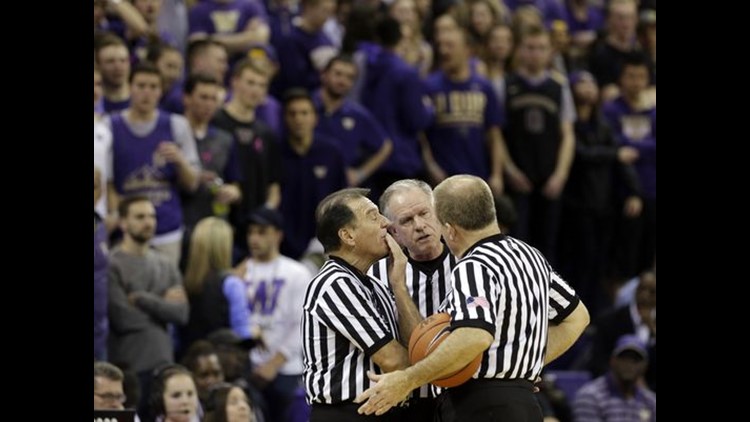CINCINNATI (AP) — Since the first jump ball of the season rose from their hands, the 1,000 or so referees who work men's Division I college basketball games have been trying to turn heads and earn a spot in the
Like the teams they officiate, the refs are being judged and graded to see if they're worthy of March Madness. Only 100 of them will make it that far, and only 10 will get to work the Final Four. Just like the teams, they're judged by their consistency and excellence under pressure in every step of a long season.
Every ref has to earn a spot each year.
"It's a very big deal," said Ted Hillary, who officiated for 37 years and worked four Final Fours. "It's a recognition for your year's work. If you get selected to move on, I guess you're doing something right."
Three years after retiring as a referee, Hillary is one of four NCAA regional advisers who attend games and grade officials with an eye toward picking the tournament crews. The complicated, time-consuming process starts before the season.
The NCAA held training sessions for the regional advisers in August followed by regional clinics for officials, emphasizing the rule changes this season aimed at making the game less physical and freeing up the offenses.
Each conference gave the NCAA a list of who it considers its best officials when the season started. The 315 who made the lists are being graded and observed by one of the regional advisers or
Evaluators fill out forms for each game, with an emphasis on judging how the officials enforce the new rules. They also grade and comment on the officials' fitness, communication, game management and accuracy of calls.
Collins officiated two Final Fours, worked as a referee coordinator in conferences, and got the national job before this season. One of his priorities has been bringing consistency to how games are called during the season as well as during the tournament.
"
Collins and the coordinators will pare the list of officials to 150 by the third week of February. An official who wasn't on the list originally could make it by impressing the observers.
During the first week in March, Collins recommends 100 officials to the men's basketball committee.
"There's a significant number of very qualified officials that either haven't made the tournament yet or didn't make it a particular year," Collins said. "It's a very tight group to get into."
Choosing the last few referees is like picking the final schools for the 68-team field with a lot of close calls. And Collins notes that officials, in general, have an accuracy rate of around 92 percent, so there's not a great discrepancy.
Those chosen know what it means.
"It's a lot of airplane rides and a lot of rental cars and a lot of driving during the season," Hillary said. "And it's your reward as much as the teams' reward. They're going through the same stuff, with a lot of bus rides."
The judging continues.
Referees are evaluated during each game of the tournament starting with the First Four in
Coaches can see a difference in how NCAA Tournament games are officiated.
"There's no doubt," Tennessee coach
Xavier coach Chris Mack has played or coached in 16 tournaments and been impressed with the consistency in how teams are treated and how the games are called.
"I think they tend to let you play a little more in the NCAA Tournament," Mack said. "I've felt every game I've ever coached in the NCAA Tournament was very well officiated. It was extremely consistent. Both teams — regardless of who they were as a seed coming into the game — got the same whistle on both ends of the floor."
That's the main goal.
"Our officials are really good," Collins said. "They do their job extremely well under high scrutiny, high stress. On the other side of the accountability coin, when they miss a call and it's a critical call or a game-deciding call, additional scrutiny is brought on them. They try to be good for 38 minutes, and really, really good the last 2."
___
AP Sports Writer Steve Megargee in



